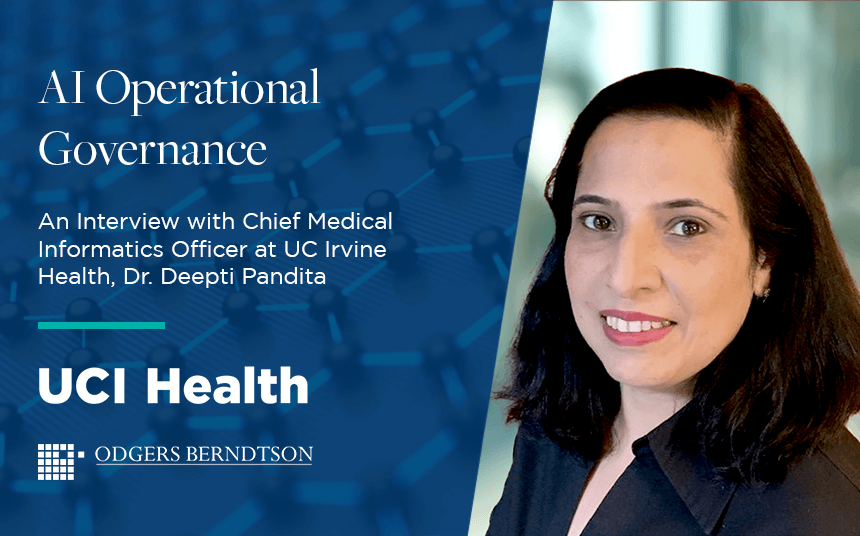John McFarland, Head of the US Healthcare Practice, speaks with Dr. Deepti Pandita, Chief Medical Informatics Officer at UC Irvine Health, on AI and having the right operational governance in place supporting adoption of tools and solutions.
John: With so much of the “hype” around generative AI behind us from 2023, the next couple of years are poised to be focused on digging into and fleshing out an enormous amount of use cases for healthcare organizations. As many organizations stand at the foot of the mountain, staring up, what should they consider with regard to taking a step back and having a plan and process for due diligence?
Dr. Pandita: It is critical that healthcare organizations approach the process of potential use of AI technology with caution and careful consideration. Firstly, they need to ensure they have a clearly defined objective regarding what are the specific problems or challenges that they aim to address, as that will guide them to the selection and implementation of the right AI tool. They also need to be aware of their own data quality and availability as they not only need to implement a solution, but also train the models on their “internal” data as opposed to just using the generic model data to get the best results. Healthcare systems need to be acutely aware of their own IT systems in terms of resources and skills needed to make AI solutions technically feasible for existing infrastructure and workflows. Lastly, healthcare organizations need to ensure AI models they are considering are compliant with regulatory practices and answer the ethical issues of the model being fair, transparent, and accountable.
John: You and your team take the approach of taking the end in mind first, then working backwards. Can you share more about how UC Irvine Health looks at the problems that need to be solved first, then goes out to look for specific technologies and solutions to solve those problems?
Dr. Pandita: Certainly! Taking the approach of starting with the end in mind and working backwards is referred to the goal oriented or outcome driven approach. In the context of care delivery this implies identifying and prioritizing the key problems or challenges that need to be addressed to achieve a specific healthcare outcome. Once the problem and the outcome are identified and prioritized, the next steps are to formulate outcome metrics, conduct a needs assessment and only then explore a technology solution which may or may not include an AI solution. Once a solution is identified then it’s a question of implementation and adoption. All plans also include an “iterate and adapt” approach to make sure we have a continuous improvement process.
John: There are obvious use cases across both clinical and administrative elements of a healthcare organization. What are your early perceptions of how initial use cases are resonating across those areas? Also, do you see those trends staying the same in the future or a dramatic shift one way or the other?
Dr. Pandita: AI is being embraced across both clinical and administrative domains in healthcare organizations and promising use cases are emerging in both areas. For example, in the clinical domain there are several hundred use cases in just imaging diagnostics and patient risk predictions as well as improvements in documentation and coding. Administrative use cases are around revenue cycle, supply chain optimization and patient engagement. In my view, the risk is lower for administrative use cases, so they will likely be ahead of the curve, whereas the clinical use cases naturally need a more cautious approach to validate and scale as they directly impact patient lives.
John: For those healthcare leaders just embarking on this generative AI due diligence journey and/or for those that haven’t yet started, what advice would you lend from your experiences thus far?
Dr. Pandita: My first advice is to not follow the hype but get educated and ensure you and your teams have the right skill mix to guide AI. Part of this is also educating your colleagues and assessing organizational readiness for AI. Once this step is complete, start small and iterate. Make sure you set up the right Governance processes and engage the right stakeholders, as this should be an organization wide initiative and not just an IT initiative. Stay abreast of ethical and regulatory implications as these are rapidly evolving. Most of all, stay flexible and adaptive as the landscape of AI is ever changing and we can all learn from experiences both within the organization and the broader healthcare community.



